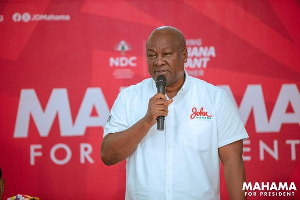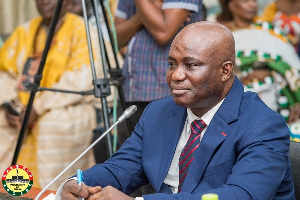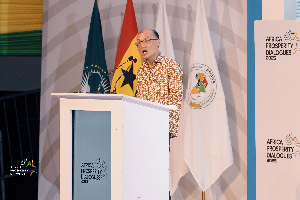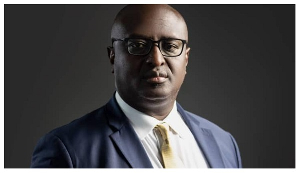John Dramani Mahama can be likened to Kwame Nkrumah, Ghana’s first president and a visionary leader whose dream of a prosperous Ghana still resonates today. Mahama’s leadership style, strategic thinking, and commitment to the nation’s development are reminiscent of Nkrumah’s ideals, making him a formidable figure in Ghanaian politics.
However, these same qualities have also made him a target of envy and disdain from the New Patriotic Party (NPP). This article explores the personal attributes of John Mahama that fuel the NPP’s animosity and why his visionary approach is a source of both admiration and fear.
Visionary Leadership: A Threat to the Status Quo
John Mahama’s ability to envision a future for Ghana that extends beyond immediate political gains is one of his defining traits. Like Kwame Nkrumah, Mahama believes in long-term planning, infrastructure development, and social progress. His tenure as president saw the launch of transformative projects, including major road networks, hospitals, schools, internet infrastructure, as well as energy infrastructure that addressed both current and future needs.
Mahama’s foresight challenges the NPP’s often short-sighted governance style, which tends to prioritize immediate political gains over sustainable development. His forward-thinking nature makes him a threat to any political opponent who lacks the same depth of vision, leading to resentment and efforts to undermine his legacy.
Economic Savvy: Balancing Present Challenges with Future Growth
Mahama’s deep understanding of economic complexities sets him apart from his peers. He possesses a unique ability to balance current economic challenges while laying the groundwork for future growth. His approach during times of crisis, such as managing the energy sector’s “dumsor” challenges and implementing policies to stabilize the economy, showcased his ability to make tough decisions for the greater good.
In 2016, John Mahama demonstrated strong fiscal discipline by managing to balance Ghana's budget without borrowing from the Central Bank, the first time in the history of this fourth republic. This was a significant achievement given the economic challenges of his tenure, including the prolonged energy crisis known as "dumsor" and the Ebola virus scare in West Africa. Mahama’s government implemented prudent economic measures such as expenditure controls, revenue mobilization efforts, and strategic debt management.
Through efficient public financial management reforms, Mahama prioritized maintaining macroeconomic stability by curbing excessive government spending and enhancing tax collection efforts. This allowed his administration to not only balance the budget but also accumulate reserves, leaving millions of dollars in the Sinking Fund and the Stabilization Fund. These funds were established to manage debt and provide a cushion against economic shocks, showcasing Mahama’s commitment to fiscal responsibility despite the pressures on the economy at the time.
The NPP often struggles to match Mahama’s economic prowess, particularly in managing public debt, inflation, and currency stability. His pragmatic approach to governance, which balances economic realities with the need for social investment, highlights his superior grasp of economic strategy. This expertise often exposes the NPP’s weaknesses, fueling their disdain and jealousy toward his persona.
Unmatched Communication Skills and Charisma
John Mahama’s exceptional communication skills and charismatic presence make him a relatable leader who connects deeply with Ghanaians. His ability to articulate complex issues in a manner that resonates with everyday people is unparalleled in modern Ghanaian politics. Mahama’s eloquence and genuine concern for the welfare of ordinary citizens set him apart from the often aloof and technocratic image of his political rivals.
This connection with the populace is a source of discomfort for the NPP, whose leaders often struggle to engage with the public in the same authentic manner. Mahama’s ability to inspire and mobilize people behind his vision creates a stark contrast with the often-divisive rhetoric seen in his opponents, leading to envy and attempts to diminish his influence.
Resilience in Adversity: Bouncing Back Stronger One of Mahama’s most admirable qualities is his resilience. Despite facing an onslaught of criticism, political setbacks, and intense media scrutiny, he has consistently demonstrated the ability to bounce back stronger. His commitment to serve Ghana, even after electoral defeats, showcases a level of perseverance that is both rare and inspiring.
This resilience frustrates the NPP, who have repeatedly tried to bury his political career through smear campaigns and false narratives. Mahama’s ability to withstand these attacks and remain a prominent figure in Ghanaian politics despite the odds only amplifies their dislike. His tenacity is a constant reminder that he is not easily silenced or defeated.
Inclusive Leadership: Championing Unity and National Cohesion
Mahama’s inclusive leadership style emphasizes unity, social justice, and national cohesion. He consistently advocates for the inclusion of all Ghanaians, regardless of their political, ethnic, or social backgrounds. His belief in building a nation that works for everyone contrasts sharply with the often-polarizing approach of his opponents.
The NPP’s antagonism toward Mahama is partly rooted in his ability to appeal across various demographics, making him a unifying figure in a highly polarized political landscape. His inclusive vision threatens those who benefit from division and partisanship, creating a deep-seated jealousy among his detractors.
Commitment to Transparency and Accountability
Mahama’s focus on transparency and accountability during his tenure has further set him apart. He has been vocal about the need to address corruption and improve governance, holding his own administration accountable while calling for reforms across all sectors.
His push for accountability is seen as a direct challenge to those who prefer to operate in the shadows, further stoking resentment. By emphasizing clean governance, Mahama exposes the failures of others, particularly those within the NPP, who have struggled with corruption scandals and mismanagement. His unwavering stance on integrity is perceived as a direct affront to those who fail to uphold similar standards, intensifying the animosity toward his persona.
Champion of the People: Mahama's Progressive Vision Challenges Conservative Power
John Mahama’s qualities have consistently drawn the ire of the NPP and its ideological predecessors. His progressive vision focused on inclusive national development contrast sharply with the myopic, tribalistic, and market-oriented policies favored by the NPP. His drive for social welfare threatens established economic and political elites making him a target. His emphasis on infrastructural development, support for agriculture, and social interventions to uplift the marginalized has been perceived as challenging the entrenched interests that the NPP tends to protect. He also embodies a populist appeal, prioritizing policies aimed at reducing inequalities and improving the quality of life for ordinary Ghanaians. This people-centered approach disrupts the status quo, fostering resentment among his political adversaries who view such moves as undermining their influence.
Conclusion: A Leader Ahead of His Time
Like Nkrumah, Mahama resonates with many ordinary Ghanaians who recognize his sincere commitment to improving their lives. Despite setbacks, his influence and popularity endure, speaking to his status as a leader driven by purpose rather than personal gain. His vision, economic acumen, charisma, resilience, inclusiveness, and integrity-makes him a formidable leader whose approach to governance is reminiscent of Kwame Nkrumah’s. However, these same traits make him a target of envy and hatred from those who feel overshadowed by his achievements. The NPP’s disdain for Mahama is not just a political rivalry; it is a reaction to his exceptional qualities that they cannot replicate. As Ghana continues to navigate its path forward, Mahama’s legacy as a leader who dared to dream big will remain a testament to what visionary leadership can achieve in the face of adversity.
Cletus Siebune
New York-USA
Opinions of Friday, 11 October 2024
Columnist: Cletus Siebune



















